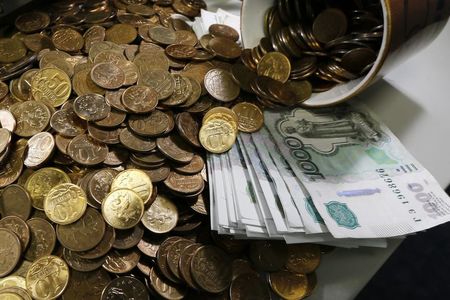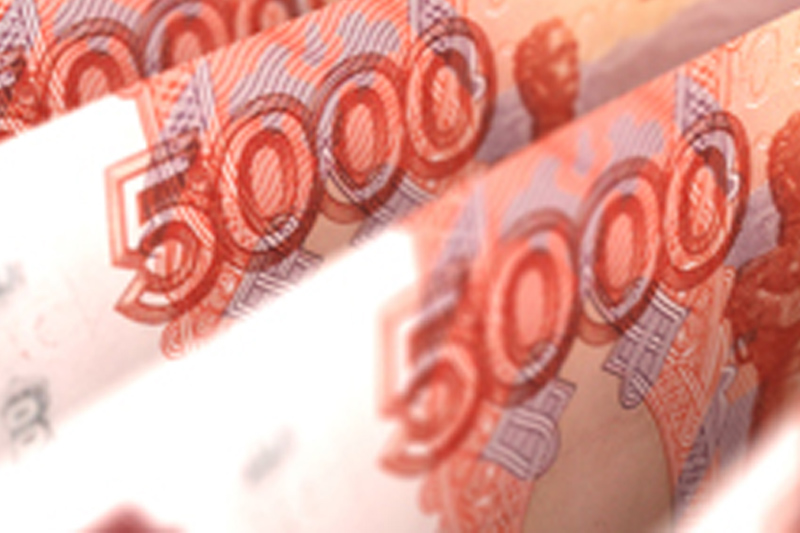By Alexander Winning and Oksana Kobzeva MOSCOW (Reuters) - Many Russians are buying dollars and hoarding cash, increasingly concerned by a slide in the rouble and wary of possible restrictions on bank withdrawals as President Vladimir Putin blames currency woes on speculators and the West.
While there is little panic on the streets of Moscow and other major cities, some Russians are taking no chances with their money, with many hardened by a financial crisis in 1998 which wiped out the savings of millions of people.
The rouble <RUB=> has fallen more than 25 percent against the dollar in 2014, with especially heavy losses in the past month when the currency repeatedly hit all-time lows despite the central bank spending around $30 billion to defend the currency.
Financial officials and the Kremlin have united in calling for calm, suggesting that speculators were to blame for the falling rouble, rather than tumbling oil prices or Western sanctions that have weakened the economy.
Putin has hinted that the global oil price has been deliberately manipulated to hurt Russia.
Russian search engine Yandex said queries such as "what to do with roubles in 2015?" hit a record high of over 1.2 million on one day last week.
Viktoria Openko, deputy head of currency conversion operations at mid-sized Russian lender B&N Bank, said demand for dollars had risen more than four times in Moscow from Oct. 9 compared with the preceding two months and the bank had to increase the number of times it restocked its branches.
"We first noticed increased demand in Moscow on Oct. 8-9, when the dollar repeatedly started to trade above 40 roubles," she said. "In the regions, the rise in demand started later, from Oct. 13, and on a lesser scale."
Representatives from VTB 24, the retail-banking arm of Russia's second-largest lender VTB (MM:VTBR), and Rosbank, part of Societe Generale Group (PA:SOGN), have seen a similar increase in forex demand.
Another mid-sized Russian lender, Soyuz, said it sold $2.3 million in dollars to customers in October, compared with $890,000 in September.
FLIGHT TO SAFETY
So far there are few signs large banks are running short of dollars, but media have reported foreign currency shortages at smaller lenders in the past week.
Four large banks were able to sell up to $10,000 to a Reuters reporter on Friday, while an office of sanctioned SMP Bank had large amounts of dollars but had run out of euros.
At a currency exchange booth in Moscow, an employee who did not wish to be named said customer behavior had changed.
"We have the same customers ringing up in the morning to check the rate. People are worried," the employee said.
Bella Zlatkis, deputy chief executive of top lender Sberbank (MM:SBER), said late last month that demand for safety deposit boxes was the most noticeable change in customer behavior.
"We can't buy safes quickly enough, the largest demand we have is for safes. I understand when people want to put dollars in safes, but at the moment there is another trend, to take out roubles and put them in a safe," Zlatkis said.
She suggested demand for safes was linked to fears that authorities could restrict bank withdrawals. "The No. 1 motivation is to save so they can't take it from you."
On Monday, the rouble firmed sharply after Putin said he hoped speculative trading on the rouble would stop soon.
By mid-afternoon it was trading more than 2 percent higher than the previous close after the central bank said it could intervene at any time to punish speculators after letting the currency float freely.
"That Russian officials from the president down are trying to talk up the rouble speaks volumes about the extent of the deterioration in sentiment toward the currency," said Nicholas Spiro, managing director of Spiro Sovereign Strategy.

"While there has been no widespread dollarisation of retail deposits, this is now a much bigger risk than it was as recently as a couple of weeks ago," Spiro said. "Today's recovery in the rouble looks and feels like a temporary respite."
(Additional reporting by Timothy Heritage and Maria Kiselyova; Editing by Elizabeth Piper and Robin Pomeroy)
